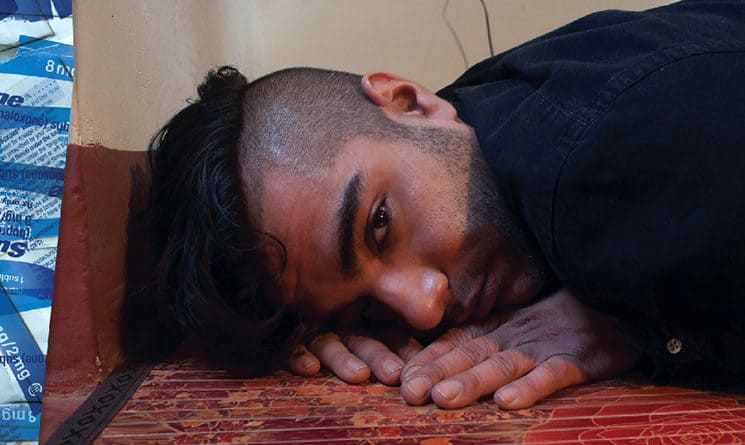Humor can be a surprisingly sharp weapon in hip-hop these days, but it’s a double-edged sword. Through jest and wordplay, MCs can engage listeners and express a range of social and political opinions without risking a fall from their soapbox. And yet, without enough earnestness, both the message and credibility are lost — an ironic twist in which the artist can become the joke.
Perhaps no one in recent memory has walked this razor’s edge better than Queens-based rapper Heems and his now-defunct slacker hip-hop group, Das Racist. The group skillfully wove social and political commentary into punch lines and clever club hits, but still, the point sometimes seemed lost in the music.
As a solo artist, Heems has sharpened his already formidable wit to an even finer edge. He’ll bring a new collection of confessional and sarcastically biting anthems to 3S Artspace in Portsmouth on Sunday, June 14. Peruvian tropical drum and bass duo Dengue Dengue Dengue! and Boston’s DJ Evaredy open the show.
Heems, a Punjabi-American rapper and Wesleyan graduate who goes by Himanshu Suri when not on stage, formed Das Racist in 2008 and scored an Internet hit with the comically simple “Combination Pizza Hut and Taco Bell.” “That was the little Trojan horse we used to break into the music world,” Heems said recently during an interview with Hot 97 radio host Peter Rosenberg.
Das Racist spent the next four years climbing out from under the heavy shadow of that novelty hit, spitting cynical wisecracks during a particularly bleak time for hip-hop. The critically acclaimed “Shut Up, Dude” and “Sit Down, Man” mix tapes paved the way for Heems’ successful record label, Greedhead, and the group’s proper debut, “Relax.” Along the way, the group solidified its role as a serious hip-hop force, despite its adversarial, tongue-in-cheek approach to the genre and a reputation for partying too hard.
Heems no longer hides behind humor, but uses it — more sparingly and deftly — to brilliantly express his feelings on post-9/11 xenophobia, racism, romantic failings, depression, and drug abuse.
In a 2009 interview with the Sepia Mutiny blog, Heems said, “We make dance music while talking about not-dancy things. We say things that, on the surface, can seem pretty dumb, but it’s a mask on some Paul Laurence Dunbar shit for actual discontent with a lot of shit in the world. … A lot of people hear ‘Pizza Hut Taco Bell’ and then have preconceived notions about our entire body of work that fall pretty flat, if you ask me.”
After the breakup of Das Racist, Heems released two mix tapes that were punctuated by moments of brilliance, most notably Nehru Jacket’s “Swate” and Wild Water Kingdom’s “Soup Boys.” However, in late 2013, after years of drug abuse and depression, Heems escaped to Mumbai, India in order to sober up and chart a new course for his solo debut and, ultimately, his life. There he channeled his frustrations and fears into the deeply personal record, “Eat, Pray, Thug,” which was released in March.
Heems no longer hides behind humor, but uses it — more sparingly and deftly — to brilliantly express his feelings on post-9/11 xenophobia, racism, romantic failings, depression, and drug abuse. Despite being known for writing some of the most biting one-liners in hip-hop, it was the airing out of his dirty laundry that gave “Eat, Pray, Thug,” and his career, the legitimacy that Das Racist never achieved.
On the record, it seems that behind every sarcastic witticism is an identifiable vulnerability, beginning with the title. “‘Eat, Pray, Thug’ is kind of tongue-in-cheek. I’m making fun of (the 2006 book) ‘Eat, Pray, Love,’” he told Rosenberg. “But, at the same time, it’s about complexity of identity in that I also had that, ‘OK, I’m going to go on my little spiritual tourism trip and clear my head,’ the same way (author Elizabeth Gilbert) did.”
Cover art from Heems' new album, Eat, Pray, Thug.
Even the use of the term “thug” seems flippant, and yet its meaning is far deeper than one might think. The slang term is short for the Indian word “thuggee,” which refers to a group of 19th-century assassins in India. Heems rhapsodized about the word’s use in an interview on National Public Radio, telling the story of the assassin gang. “It’s about the nature of language and where language comes from. … Maybe a reclamation of the word thug, in a sense,” he said.
The record’s material is equally provocative. On the opener, “Sometimes,” we find Heems stuck in between the pressures of competing worlds, revealing the constant contradictions in the ups and downs of the artist’s emotional state. This serves as an introduction to the dualities of his psyche, his place in music, racial identity, and, as a result, the musical styles on the album.
“Eat, Pray, Thug” bounces back and forth between poppy break-up songs like “Home,” produced by Blood Orange’s Dev Hynes; danceable party numbers like “Pop Song” and “Hubba Hubba,” and hard-hitting political confessionals like “Patriot Act,” “Al-Q8A” and “Flag Shopping.” It may seem a bit scattered, but it’s an accurate and honest portrait of an artist maturing before our eyes.
Heems tweeted after its release, “I made an album at the end of 2013 in one of the darkest periods of my life.” Now that the substance of Heems’ music has beaten out its style (without diminishing it), he’s found a compelling balance between his engagement and apathy, the gag and the genuine.
Heems performs Sunday, June 14 at 8 p.m. at 3S Artspace, 319 Vaughan St., Portsmouth. Dengue Dengue Dengue! and DJ Evaredy open. Tickets are $16, available at 3sarts.org.

